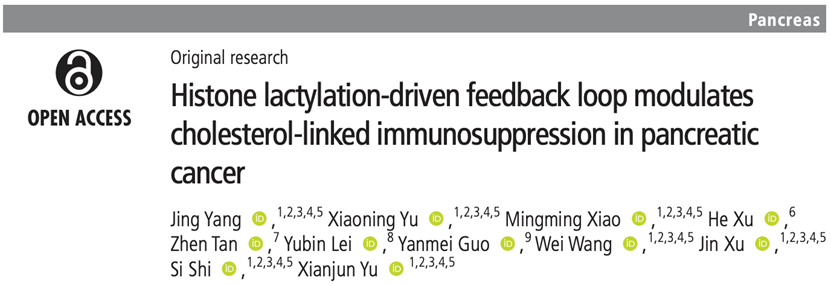NEWSROOM
-
Fudan University Shanghai Cancer Center Breakthrough Discovery: “Metabolic Waste” Offers New Hope for Immunotherapy in "King of Cancers"
Recently, the research team led by Professor Xianjun Yu and Doctor Si Shi from Fudan University Shanghai Cancer Center published a groundbreaking study revealing that lactate, traditionally regarded as a “metabolic waste,” plays a pivotal role in regulating gene expression and protein function in pancreatic cancer. Their findings establish a novel mechanism—linking lactate metabolism, epigenetic regulation, and cholesterol-driven immunosuppression—thereby unveiling a new strategy to overcome the barriers of immunotherapy in pancreatic cancer. Published in the prestigious journal GUT, this study provides a new path to reinvigorate anti-tumor immunity and demonstrates synergistic effects when combined with PD-1 inhibitors.

Tumor Microenvironment: The Stubborn Fortress to Immunotherapy in Pancreatic Cancer
Pancreatic cancer, known as the "king of cancers" due to its insidious symptoms, complex anatomical location, and extremely low survival rate. While immune checkpoint inhibitors, especially PD-1/PD-L1 blockers, have revolutionized treatment in many solid tumors, their efficacy in pancreatic cancer has been disappointing, with most clinical trials yielding minimal benefit.
Professor Xianjun Yu, the president of Fudan University Shanghai Cancer Center, noted that the highly immunosuppressive tumor microenvironment (TME) is a key barrier to immunotherapy success in pancreatic cancer. Strategies that can effectively remodel this TME and enhance immune responsiveness are urgently needed.
According to research, tumor cells (especially in pancreatic cancer) often rely on glycolysis to produce large amounts of lactate, creating an "acidic microenvironment". Studies have confirmed that lactate, previously considered merely a cellular "metabolic waste product," can function as a "signaling molecule" that directly regulates gene expression through histone lactylation modifications. This discovery overturns the traditional view of lactate as simply a metabolic byproduct, establishing it as a key regulatory molecule for controlling gene expression and protein function.
However, the precise molecular mechanisms by which histone lactylation regulates tumor progression and immune evasion in pancreatic cancer—and whether targeting this mechanism could unlock immunotherapy resistance in this "king of cancers"—remain unclear and have yet to be fully elucidated in research.
A New Path to Enhance PD-1 Therapy in Pancreatic Cancer
To elucidate the role of histone lactylation in the failure of immunotherapy for pancreatic cancer, Professor Xianjun Yu and Doctor Si Shi conducted an in-depth investigation.
Through lactylation-specific proteomic analysis, the research team identified that histone H3 lysine 18 lactylation (H3K18la) was the most significantly upregulated modification and correlated with poor prognosis. Lactate-driven H3K18la was found to transcriptionally activate the acetyltransferase ACAT2, which further elevated intracellular lactate levels in pancreatic cancer cells. Moreover, the study revealed that overexpression of ACAT2 in pancreatic cancer cells promoted the polarization of tumor-associated macrophages (TAMs) toward the immunosuppressive M2 phenotype. These M2-type TAMs then suppressed CD8⁺ T cell activity, leading to the formation of an “immune desert” microenvironment and resulting in poor response to immunotherapy. These findings suggest that targeted degradation of ACAT2 may serve as a precise approach to dismantle immune suppression.
Mechanistically, lactate-induced H3K18la acts as a “molecular switch” to activate ACAT2 transcription. ACAT2, in turn, acetylates mitochondrial carrier homolog 2 (MTCH2) at lysine 100, stabilizing its protein expression. Accumulated MTCH2 disrupts mitochondrial oxidative phosphorylation, further enhancing lactate production and forming a positive “lactate→H3K18la→ACAT2→MTCH2→lactate” feedback loop, which drives pancreatic cancer progression.
More importantly, ACAT2 also promotes cholesterol biosynthesis and facilitates cholesterol delivery to TAMs via small extracellular vesicles (sEVs), reinforcing their polarization into the M2 immunosuppressive phenotype and forming an “immune barrier” that excludes CD8⁺ T cells. Given the pivotal role of ACAT2, the research team innovatively designed and synthesized a protein degradation-targeting chimera (PROTAC) named AP1 to specifically degrade ACAT2. When combined with anti-PD-1 antibodies, AP1 demonstrated a remarkable synergistic anti-tumor effect, significantly inhibiting tumor growth and prolonging survival in mouse models.
Professor Yu emphasized that this study is the first to establish the novel "lactate–epigenetics–cholesterol immunosuppressive axis," offering a new strategy to unlock the immunotherapy potential in pancreatic cancer. This discovery holds promise to transform pancreatic cancer from an “immune desert” into an “immune-responsive” tumor, bringing new hope to patients.
Tackling the "Cancer King": The "Shanghai Solution" for Pancreatic Cancer Diagnosis and Treatment
As a National Key Clinical Specialty, the Pancreatic Surgery Department of Fudan University Shanghai Cancer Center adheres to the principle of "Three Parallel Development"-integrating clinical practice with scientific research, combining internal medicine and surgery, and balancing minimally invasive with open surgeries-to actively advance disciplinary development. The goal is to build a leading national and world-class center for pancreatic tumor diagnosis, treatment, education, and research.
Under the leadership of Professor Xianjun Yu, the discipline leader and president of Fudan University Shanghai Cancer Center, the team has carried out a series of groundbreaking translational studies forming the "Shanghai Solution" for the diagnosis and treatment of pancreatic cancer, and significantly improving the safety, radicality and effectiveness of pancreatic cancer surgery. Data shows that the 3-year postoperative survival rate of pancreatic cancer patients undergoing surgery at Fudan University Shanghai Cancer Center reached 56%, ranking first in Shanghai and surpassing the international advanced level.
The team's numerous original achievements have been incorporated into both international and domestic guidelines. The team also led the drafting of the “Comprehensive Diagnosis and Treatment Guidelines for Pancreatic Cancer (2018 and 2020 editions), which have been adopted nationwide. In recent years, the team has been honored with prestigious awards including the First Prize of the Shanghai Science and Technology Progress Award, the First Prize of the Chinese Anti-Cancer Association Science and Technology Award, and the First Prize of the Shanghai Medical Science and Technology Award.

